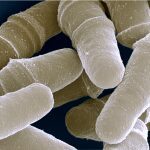Lien vers Pubmed [PMID] – 18388861
EMBO J. 2008 May;27(9):1378-87
Recombination is essential for the recovery of stalled/collapsed replication forks and therefore for the maintenance of genomic stability. The situation becomes critical when the replication fork collides with an unrepaired single-strand break and converts it into a one-ended double-strand break. We show in fission yeast that a unique broken replication fork requires the homologous recombination (HR) enzymes for cell viability. Two structure-specific heterodimeric endonucleases participate in two different resolution pathways. Mus81/Eme1 is essential when the sister chromatid is used for repair; conversely, Swi9/Swi10 is essential when an ectopic sequence is used for repair. Consequently, the utilization of these two HR modes of resolution mainly relies on the ratio of unique and repeated sequences present in various eukaryotic genomes. We also provide molecular evidence for sister recombination intermediates. These findings demonstrate that Mus81/Eme1 is the dedicated endonuclease that resolves sister chromatid recombination intermediates during the repair of broken replication forks.

